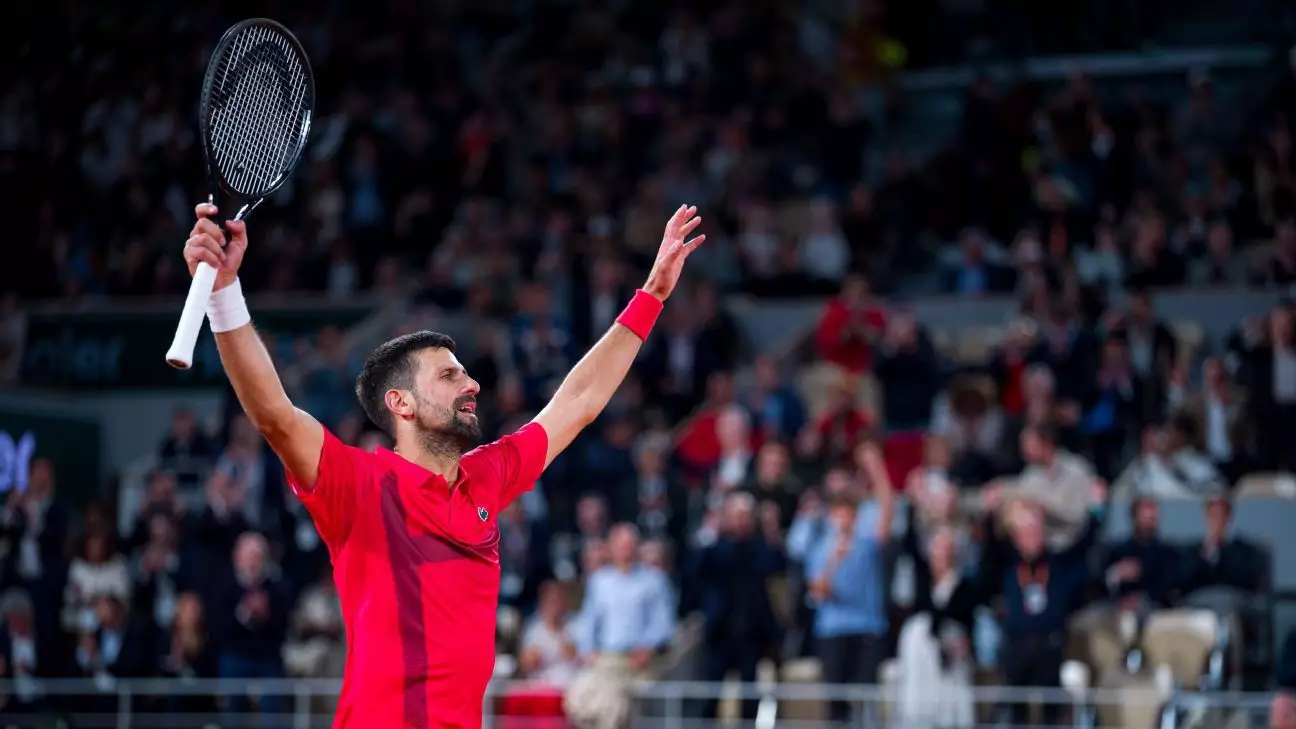As Novak Djokovic steps onto one of tennis’s most illustrious stages, his legacy continues to evolve in unexpected ways. At 38, Djokovic isn’t just a seasoned player; he is a living testament to perseverance. Winning his 100th title in Geneva might have set the stage for his run at the French Open, but skepticism abounded regarding his prospects. Few believed he could reclaim dominance at Roland Garros, especially following a painful withdrawal from his semifinal at the Australian Open earlier in the year. However, his quarterfinal match against Alexander Zverev marked a significant turning point, showcasing not only his skill but also his indomitable spirit, as he triumphed with a score of 4-6, 6-3, 6-2, 6-4.
Reinvention and Tactical Brilliance
What set this match apart from Djokovic’s recent outings was not merely the win itself but how he orchestrated his comeback. After dropping the first set and struggling with his serve initially, Djokovic demonstrated his renowned ability to adapt under pressure. Switching rackets after losing his opening service game was not just a tactical decision; it symbolized his relentless pursuit of perfection. Only one service break marred his game, revealing the mental fortitude that has allowed him to navigate challenging matches for nearly two decades.
Djokovic’s service statistics were eye-catching; by the match’s end, he had corrected his earlier missteps and delivered first serves with near-precision in the following sets. Playing aggressively yet wisely, he progressively tightened his grip on the match, illustrating his mastery over the court. This was not a mere contest of pure power. Instead, it was an art form; Djokovic’s use of varied techniques, including slicing and strategic drop shots, kept Zverev off-balance. These drop shots proved crucial, allowing him to dictate the match’s rhythm and control the tempo—a hallmark of his tactical style.
The Power of Adaptation
In tennis, where mental agility is just as important as physical ability, Djokovic’s shift in strategy can be seen as an embodiment of his entire career. Even in moments of vulnerability—like a faltering opening set—he turned the pressure into an opportunity for reinvention, showcasing his unparalleled ability to regroup. By adapting his approach, particularly with the drop shots—hitting 35 over the course of the match—Djokovic exploited Zverev’s weaknesses, forcing him to contend with indecision. This adaptability has become Djokovic’s signature move; he thrives on rearranging strategies, making him a relentless opponent even in his later years.
As Zverev struggled to find footing, particularly on his second serves, Djokovic capitalized. Some analysts may choose to diminish this victory by emphasizing Zverev’s performance; however, the reality is stark: Djokovic’s tactical finesse and mental fortitude dictated the match’s outcome, driving Zverev into retreat. Every well-placed drop shot, every altered rally pace reinforced Djokovic’s narrative—this competition was not merely about athletic prowess but also about psychological warfare.
Facing the Titans
Looking ahead to his semifinal against world No. 1 Jannik Sinner, Djokovic is set to enter the lion’s den once again, where stakes are astronomically high. Sinner, who has previously triumphed over Djokovic in their last three encounters, presents a formidable challenge. Yet, Djokovic has embarked on this journey with an insatiable hunger to reclaim his throne at the top of the game.
Moreover, should he advance, the potential showdown against world No. 2 Carlos Alcaraz awaits—a scenario that no player has navigated successfully in the modern era. Overcoming the top three players consecutively in a Grand Slam is a daunting mountain to climb. But if there’s one thing history tells us about Djokovic, it’s that he thrives amidst adversity, drawing on the very doubts of others to galvanize his performance.
In a landscape where many see a sunset, Djokovic remains determined to carve a new dawn, one battle at a time. His journey through Roland Garros serves as a potent reminder that age is merely a number, and one’s greatness is defined not only by victories but by the sheer resolve to rise each time one falls.

